|
|
|
Sort Order |
|
|
|
Items / Page
|
|
|
|
|
|
|
| Srl | Item |
| 1 |
ID:
086137
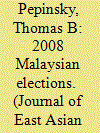

|
|
|
|
|
| Publication |
2009.
|
| Summary/Abstract |
Malaysia's twelfth general elections, held on March 8, 2008, dealt a stunning blow to the incumbent Barisan Nasional regime. For the first time since 1969, the coalition did not receive its customary two-thirds majority in the lower house of parliament. Moreover, the opposition was able to form governments in five out of eleven peninsular Malaysian states. This article uses electoral, economic, and demographic data to test a number of potential explanations for these outcomes. Evidence indicates that the regime's decreased majority is the consequence of non-Malay voters' rejecting the incumbent regime in favor of secular opposition parties.
|
|
|
|
|
|
|
|
|
|
|
|
|
|
|
|
| 2 |
ID:
083117
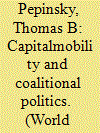

|
|
|
|
|
| Publication |
2008.
|
| Summary/Abstract |
This article investigates the coalitional bases of authoritarian rule to explain striking variation in adjustment policy to the Asian Financial Crisis in Indonesia and Malaysia. Given currency depreciation with financial sector fragility, holders of mobile assets prefer to maintain an open capital account, while owners of fixed assets and labor favor restrictions of capital mobility to facilitate expansionary macroeconomic policies. Differences in adjustment policy across the two countries reflect differences in the political coalitions supporting the authoritarian regimes. These findings illuminate the nature of political conflict during financial crises and show how a nuanced view of the coalitions supporting authoritarian rule can yield powerful insights into the political economy of authoritarianism and economic adjustment in a global economy.
|
|
|
|
|
|
|
|
|
|
|
|
|
|
|
|
| 3 |
ID:
133784
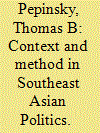

|
|
|
|
|
| Publication |
2014.
|
| Summary/Abstract |
This essay introduces and evaluates a central debate about context sensitivity in Southeast Asian political studies. Within this diverse field, there is no agreement about what context means, or how to be sensitive to it. I develop the idea of unit context (traditionally, the area studies concern) and population context (traditionally, the comparative politics concern) as parallel organizing principles in Southeast Asian political studies. The unit context/population context distinction does not track the now-familiar debates of qualitative versus quantitative analysis, nor debates about positivist epistemology and its interpretivist alternatives, nor even political science versus area studies. Context is not method, nor epistemology, nor discipline. Rather, the core distinction between unit-focused and population-focused research lies in assumptions about the possibility of comparison, or what methodologists call unit homogeneity. While I conclude on an optimistic note that a diverse Southeast Asian political studies (embracing many disciplines and many methodologies) is possible, the fact remains that unit context and population context are fundamentally incommensurate as frameworks for approaching Southeast Asian politics, and that population context is the superior approach.
|
|
|
|
|
|
|
|
|
|
|
|
|
|
|
|
| 4 |
ID:
108351
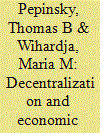

|
|
|
|
|
| Publication |
2011.
|
| Summary/Abstract |
Indonesia's 1999 decentralization law gave local governments in Indonesia an unprecedented opportunity to adopt prodevelopment policies. In this article, we study whether decentralization has in fact generated improved economic performance in Indonesia. Using a synthetic case control methodology, we argue that Indonesian decentralization has had no discernable effect on the country's national-level economic performance. To explain why not, we use subnational data to probe two political economy mechanisms-interjurisdictional competition and democratic accountability-that underlie all theories linking decentralization to better economic outcomes. Our findings suggest that extreme heterogeneity in endowments, factor immobility, and the endogenous deterioration of local governance institutions can each undermine the supposed development-enhancing promises of decentralized government in emerging economies such as Indonesia.
|
|
|
|
|
|
|
|
|
|
|
|
|
|
|
|
| 5 |
ID:
096597


|
|
|
|
|
| Publication |
2010.
|
| Summary/Abstract |
Comparative politics has witnessed periodic debates between proponents of contextually sensitive area studies research and others who view such work as unscientific, noncumulative, or of limited relevance for advancing broader social science knowledge. In Southeast Asia in Political Science: Theory, Region, and Qualitative Analysis, edited by Erik Martinez Kuhonta, Dan Slater, and Tuong Vu, a group of bright, young Southeast Asianists argue that contextually sensitive research in Southeast Asia using qualitative research methods has made fundamental and lasting contributions to comparative politics. They challenge other Southeast Asianists to assert proudly the contributions that their work has made and urge the rest of the comparative politics discipline to take these contributions seriously. This symposium includes four short critical reviews of Southeast Asia in Political Science by political scientists representing diverse scholarly traditions. The reviews address both the methodological and the theoretical orientations of the book and are followed by a response from the editors.
|
|
|
|
|
|
|
|
|
|
|
|
|
|
|
|
| 6 |
ID:
118160
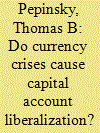

|
|
|
|
|
| Publication |
2012.
|
| Summary/Abstract |
A central argument in the literature on economic crises and policy reform is that currency crises lead governments to liberalize their capital accounts in order to establish their credibility to international markets. I argue that the reverse is true: currency crises lead governments to restrict capital flows as a form of self-help. Using instrumental variables to account for the possibility that capital account liberalization causes currency crises, I show that currency crises are robustly associated with capital account closure across developing countries. The findings refocus the debate on currency crises and capital account liberalization and contribute to larger debates about the role of critical junctures in prompting neoliberal policy reform.
|
|
|
|
|
|
|
|
|
|
|
|
|
|
|
|
| 7 |
ID:
178567


|
|
|
|
|
| Summary/Abstract |
Analyses of embedded liberalism have focused overwhelmingly on trade in goods and capital, to the exclusion of migration. We argue that much as capital controls were essential components of the embedded liberal compromise, so too were restrictions on the democratic and social rights of labor migrants. Generous welfare programs in labor-receiving countries thrived alongside inclusionary immigration policies, but this balanced arrangement was only tenable if migrants were politically excluded in their destination countries. That is, embedded liberalism abroad rested on exclusionary political foundations at home. In bringing together the IPE literature on the “globalization trilemma” with the comparative politics of citizenship, we provide a novel account of how embedded liberalism worked politically, with implications for current debates about the fate of the liberal order in a time of populist resurgence.
|
|
|
|
|
|
|
|
|
|
|
|
|
|
|
|
| 8 |
ID:
066281
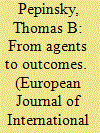

|
|
|
| 9 |
ID:
111681
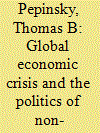

|
|
|
|
|
| Publication |
2012.
|
| Summary/Abstract |
This paper investigates the effects of the global economic crisis (GEC) on political change. A number of emerging European economies have experienced political turnover, but in other emerging and transition economies, government turnover and regime change have been comparatively rare. Two factors - incumbent governments' responsibility for the current crisis and their responsiveness to its domestic economic effects - shape the political effects of the GEC. Outside Europe, most emerging economies have experienced this crisis as an external shock to trade and investment rather than a domestic financial crisis. As a consequence, their governments have experienced less severe economic contractions, and have been able credibly to portray themselves as victims of, rather than causes of, the economic difficulties that they currently face. By placing political turnover in emerging Europe in comparative perspective, this argument provides a new perspective on the consequences of economic integration on national politics for emerging economies around the world.
|
|
|
|
|
|
|
|
|
|
|
|
|
|
|
|
| 10 |
ID:
140285
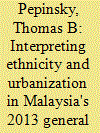

|
|
|
|
|
| Summary/Abstract |
In this article I reinterpret Ng, Rangel, Vaithilingam, and Pillay's analysis in this issue of pro-BN voting in Peninsular Malaysia in Malaysia's 2013 general election. I show that the authors' statistical methods are inappropriate for testing whether district ethnicity predicts district-level BN vote share, and that their modeling choices result in tests of hypotheses that do not exist and cannot be derived from standard theoretical approaches to ethnic voting in Malaysia. I then provide a range of statistical evidence that supports three main conclusions: (1) ethnicity and district area (a proxy for urbanization) both predict BN vote shares at the district level, (2) neither the effect of ethnicity nor of district area can be reduced to the other, and (3) there is no interactive effect between ethnicity and urbanization. These results are in direct contradiction with the authors' results, and apply equally in Peninsular Malaysia and the entire country. I also discuss the broader issues that emerge when testing competing theories of BN vote share.
|
|
|
|
|
|
|
|
|
|
|
|
|
|
|
|
| 11 |
ID:
119225
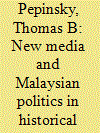

|
|
|
|
|
| Publication |
2013.
|
| Summary/Abstract |
This essay is a critical examination of the ability of Malaysia's new media to promote political liberalization. Drawing on a historical approach to Malaysia's political development since independence, it argues that the political effects of the rise of Malaysia's new media are best understood as being parallel to those of modernization and socio-economic change from previous decades, which augured important changes in the political strategies of incumbent and opposition politicians, but did not upset the fundamental logic through which the Barisan Nasional (BN) regime has ruled since the 1970s. That logic of rule is closely attuned to Malaysia's cleavage structure, which centres on ethnicity and the economy and which has pervaded ?the country's politics since independence. Malaysia's new media - despite being far more open to critical voices than its establishment print and broadcast media - serve as venue in which more basic political conflicts are waged. Although Malaysia's 13th General Elections may spell further losses for the ruling BN, this essay argues that the rise of Malaysia's new media is unlikely to be responsible for political liberalization. Instead, liberalizing pressures are most likely to be effective when groups targeting democratic processes and procedures, thereby superseding Malaysia's cleavage politics.
|
|
|
|
|
|
|
|
|
|
|
|
|
|
|
|
| 12 |
ID:
156838
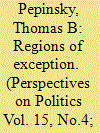

|
|
|
|
|
| Summary/Abstract |
Regions of exception play a critical role in contemporary world politics: they are sites of civil conflict, economic backwardness, secessionist movements, opposition party support, and challenges to contemporary national projects. I argue in this article that the mainstream methodological language for understanding subnational politics renders such important cases illegible precisely because of these regions’ distinct histories and social structures. Using case materials drawn from contemporary Southeast Asia, I illustrate how to conceptualize regions of exception as representing particular tensions between the insights from comparative politics and area studies, with challenges for a purist view of causal inference in political science. Recognizing the challenges presented by regions of exception will help political scientists to better grasp key issues in contemporary world politics.
|
|
|
|
|
|
|
|
|
|
|
|
|
|
|
|
| 13 |
ID:
139918


|
|
|
|
|
| Summary/Abstract |
This article proposes a political economy approach to decolonization. Focusing on the industrial organization of agriculture, it argues that competition between colonial and metropolitan producers creates demands for decolonization from within the metropole when colonies have broad export profiles and when export industries are controlled by colonial, as opposed to metropolitan, interests. The author applies this framework to the United States in the early 1900s, showing that different structures of the colonial sugar industries in the Philippines, Hawaii, and Puerto Rico–diverse exports with dispersed local ownership versus monocrop economies dominated by large US firms–explain why protectionist continental-agriculture interests agitated so effectively for independence for the Philippines, but not for Hawaii or Puerto Rico. A comparative historical analysis of the three colonial economies and the Philippine independence debates complemented by a statistical analysis of roll call votes in the Hare-Hawes-Cutting Act supports the argument. In providing a new perspective on economic relations in the late-colonial era, the argument highlights issues of trade and empire in US history that span the subfields of American political development, comparative politics, and international political economy.
|
|
|
|
|
|
|
|
|
|
|
|
|
|
|
|
|
|
|
|
|